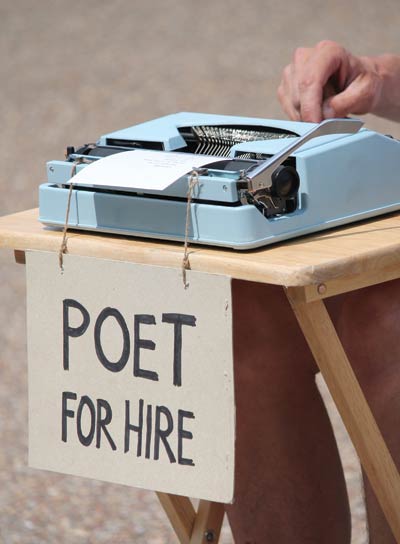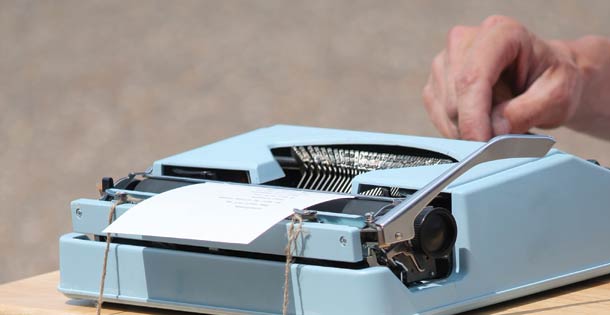
Visitors to the pharmacy at Miami’s Jackson Memorial Hospital were greeted several months ago by teams dispensing more than medicine. They were dispensing poems — that’s right, I said poems — in Spanish, Creole, and English, each rolled up and stuffed into a pill bottle. These so-called Poetry Prescriptions were the brainchild of a local arts group named O, Miami. Meanwhile, in the hospital’s rehab unit, local poets were listening to patients’ life stories — then turning them into original poems.
Impressively, poetry has survived the indignities of Hallmark cards, newspaper poems-of-the-day, and classroom rhyming exercises. Now, thanks to the internet, the popularity of performance competitions known as “poetry slams,” and the influence of lit-loving hipsters in towns all across the land, poetry is fighting its way back, often showing up in unexpected places.
Earlier this year, as a guest on ABC’s Jimmy Kimmel Live!, actor Bill Murray chose to read a powerful poem, which visibly moved him. I have noticed that even in my world, which is populated by hardened journalists, poetry has increasingly found its way into conversation. It’s always a thrill when that happens.
In case you were wondering, yes, it was like just a week ago that the sad news was everywhere: Poetry was toast. It was “dragged out only when a moment of patriotic crisis occurred or on the solemn occasion of death,” my poet friend Herbert Woodward Martin (On the Flyleaf) explained to me.
Even more troubling, the little books weren’t selling anymore and Google searches for “poetry” had nosedived. Nothing’s verse than that. (Sorry.) The other day, I even spotted a lament for poetry within a poem itself. In a new-ish work titled “Car Wash,” University of Massachusetts-Boston poetry professor Jill McDonough wrote, “You can tell a secret in a poem and it will stay a secret / forever. No one reads poems except for me and you.”
Fortunately, that’s not exactly true today. What happened? Once again, credit can be traced mostly to the tech revolution. “Thanks to the ease of sharing poems through email and social media, it’s possible that poetry’s audience may be greater now than ever,” according to Kate Angus, an editor and poet (So Late to the Party) who offered that observation in a lengthy report on the decline of the poetry book trade.
“Thanks to the ease of sharing through email and social media, it’s possible that poetry’s audience may be greater now than ever.”
So, the trend is encouraging. Matthew Zapruder, the new poetry editor of The New York Times Magazine, declared in a Times essay this year that poetry “is in fine shape now … even though there is a small industry of people periodically informing us it’s dead.” How has poetry effectively beaten back the lingering impression that it’s a priggish, Old World art form? Simple, Zapruder says. Poems are “an assertion of both a particular imagination and a common humanity, the possibility that my dreams can be yours, and vice versa.” Ultimately, that’s a persuasive call to the optimism that resides deep within so many of us.
The reanimation of the American poetry community has caused a sort of holy cow! among its practitioners. Due principally to its urban/hip-hop appeal, slams are going like crazy at clubs, taverns, and schools, introducing a new generation to the high-impact cadence of modern poetry.
Even those who are accustomed to reciting their work aloud, but never in a competitive setting, note the recent surge in interest. Ivan Jenson, a Michigan-based poet (Media Child and Other Poems), told me by email, “The enthusiasm at my poetry readings resembles a pop concert.”
For poets and poetry lovers all across America, this dawning reality of a wildly appreciative audience may seem to defy both rhyme and reason. It may even be temporary, but let’s agree it’s a sweet kind of poetic justice and leave it at that.
Become a Saturday Evening Post member and enjoy unlimited access. Subscribe now




Comments
Poetry has never been dead; most songs are poetry. I think reading in general is dying, and there’s so much bad poetry out there (i.e. it doesn’t make sense to anyone except the person who wrote it).
Anne, we need to learn to enjoy our own company. When I have solitude, I produce my best work.
Tiz so good to read and to hear
Poetry is on some comeback.
For Ima Ryma, sonneteer,
To rhyme with reason takes a knack,
Especially the sonnet sort,
A 14 liner metered verse.
The trick is keep the artsy short,
A nonsense sonnet – nothing worse.
Sending sonnets through cyberspace
Can now be done at any time,
Can be comments most any place.
For any reason there’s a rhyme.
I love writing sonnets a gob,
But to eat – still keep my day job.
The question should be, “Is solitude dead?” If we keep solitude, not loneliness, alive, serious poetry will survive. Unfortunately, solitude is eschewed by more and more souls in this age of communication and instant gratification.